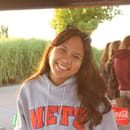Starting a conversation with meeting someone new at university usually consists of four things: name, hometown, age, and lastly, program.
This information runs like a cycle when asked. And at this party, the cycle is spun over and over again. On one hand, I’ll most likely never see these people again, but on the other, I’m leaving them with these four key things. While these four things do not define me, they do define who I am in their eyes.
I can usually tell how a person feels about their program based on how they talk about it. A soft smile indicates they love it (and possibly create secret Pinterest boards mapping out their entire careers). Someone speaking with a confident tone means they are in a program people fawn over — even if they might not enjoy it themselves. And if a person gives a little shrug at the end, they would rather move on.
I sit back and watch, capturing a glimpse into people’s lives outside of this dingy dorm.
The invisible baton gets passed to my two friends. My friend on the left is studying sociology. My friend on the right is studying business management, with law school awaiting her. My best friend looks at me, signalling my turn. Then, I mentally tick off each box in my head. The first three facts go by without a hitch. One more box to go: what program are you in?
I proudly tell everyone I am studying journalism — wearing it like a badge of honour. But that excitement and pride are quickly drained out of me. I am left blankly staring at a girl across from me who had one thing to say, “Oh.”
There may have been other reactions, but my mind is racing to justify her reaction. Maybe she doesn’t hear that answer often. Maybe I don’t look like someone who would be studying journalism. Maybe she slipped up, and it was a complete accident. I try to make small talk with the people around me, but that “oh” continues to itch away at me.
Why didn’t she say, “Oh, that is super cool” or “Oh, I’ve never heard of that before. Can you tell me more?”
None of that. Just “Oh.”
To this day, that “oh” still pierces my mind.
Whenever I revisit that party, it’s one of the first things that reappears. It was a night full of laughs, cries, singing, and dancing with people I love, but amidst all of that was my anxious self trying to grapple with a little comment.
For the majority of my life, I struggled to talk about my aspirations. Or lack thereof. Whenever my mom or my titas (aunts) tried to ask me the typical “What do you want to do in the future?” question, I never knew how to respond.
Is there a right answer?
You get to a certain age where you have to share something to avoid getting badgered. So, I made a list. An imaginary list of careers, and every single time that question was asked, I would scratch one off the list, praying it met their standards. Which included:
- Police office
- Professional volleyball player
- Psychologist
- High school English teacher
- Sports commentator
- YouTuber (which wasn’t exactly well received)
I had a mechanical response to every question that arose. I also had a topic on hand to maneuver the conversation in another direction. This quickly became routine.
When I got a little older, my titas would push the medical school agenda on me. They wanted me to be a nurse, a doctor or something that involved a PhD. I think they wanted it for them more than for me. They needed a reason to brag at house parties or hang a shiny new degree on their walls.
Each new idea was their way of moulding me into the person they wanted me to become, and it worked. I wired myself to shred every seed of doubt that was planted in my brain because I couldn’t let go. I knew that change comes with its consequences, and at thirteen, I was not ready for that.
But this notion of “sticking to the plan” unravelled once I entered high school. One month of learning algebra and struggling to balance chemical equations left me puzzled and helpless. I was falling behind, and I was never going to magically fall in love with STEM. I knew I couldn’t keep going down this path. The only thing that was stopping me from acting on this was my own anxiety.
I wasn’t going to fit the character that stereotypical Asian households project onto their kids: becoming a lawyer, doctor, engineer, or the next Canadian prime minister. By venturing into something different, I felt like I was letting other people down, and that haunted me. I’ve been told my whole life to get a job that was lucrative. According to them, money comes before passion. Once you earn money, then you can explore your passions. But I never saw it that way.
I always believed you should seek out the things you love. And that is what I decided to do. Through my final two years of high school, I pursued my love for writing and photography, which ultimately led me to the Journalism program at Toronto Metropolitan University (TMU).
I was doing something that was different than all my friends in STEM, but the prospect of becoming a journalist has thrilled me like no other. Though my friends, teachers, and relatives have supported my ambitions, there are times when I feel like my studies are not as valid as theirs.
People are constantly underlining that the humanities and arts are easier than STEM. This phenomenon has spread throughout society like wildfire, changing the way I and so many creatives feel about their work.
There are instances where I can’t bring myself to discuss my work because other’s responses deemed nothing I was working on was as significant as what my friends were learning in physics or calculus.
I have been told numerous times that I am “so lucky because my classes are easy.” Every minute spent stressing over a long-form essay or a written test has been dumbed down to “easy.” It’s said so frequently to the point where “easy” starts to sound like “irrelevant.”
When I start to question if my artistic ambitions are worthwhile, I lean on the words of my favourite character, Meg March, from Little Women, “Just because my dreams are different than yours, it doesn’t mean they’re unimportant.”
Though in Little Women, Meg March was dreaming of getting married and starting a family, I could still feel Alcott’s words seep through the page. As a student in The Creative School, I am reminded of this sentiment regularly.
Every week, I get to be in a classroom full of people with similar goals. It’s a community of people who don’t perceive the arts as a “side hustle,” like the general public, but rather something worth turning into a career. These are people who have been asked, “So, what’s your backup plan?” on a daily basis.
But it’s not a backup plan. We are here because this is the plan!
We are all here because we believe that what we love is worth fighting for. It’s worth living and turning into something greater. That alone has made it all worthwhile. Just because my dreams don’t require wearing a lab coat doesn’t mean my dreams are unimportant. My dreams are important, and so are all of yours.


